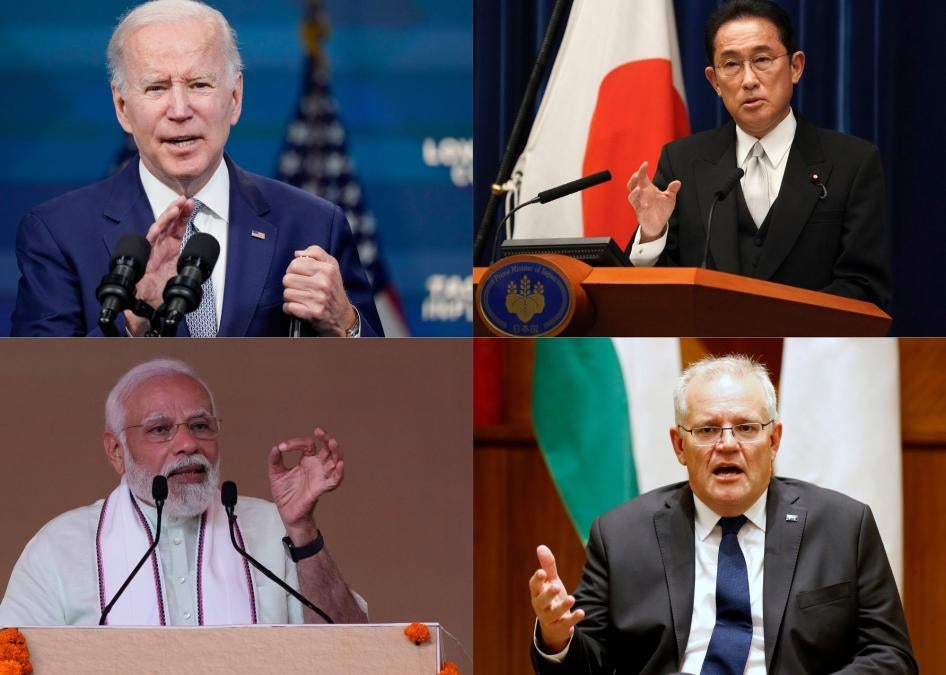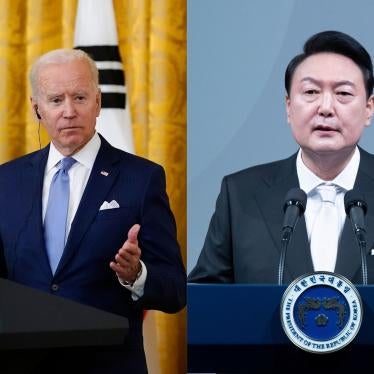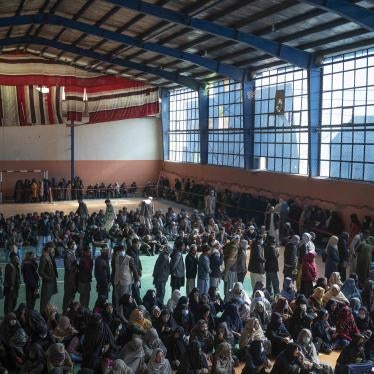(Tokyo) – Leaders of the United States, Japan, India, and Australia should reach agreements on new measures to address human rights crises and democratic backsliding in Asia, Human Rights Watch said today. The Quad, a security alliance of the leaders of the four countries, is meeting in Tokyo on May 22, 2022.
“The Quad needs to place Asia’s massive human rights and humanitarian crises at the heart of its discussions and decisions,” said John Sifton, Asia advocacy director at Human Rights Watch. “Although each has vastly different causes and features, the human rights crises in Afghanistan, Myanmar, North Korea, and Sri Lanka should all be high on the security agenda.”
A central purpose of the Quad alliance is to counter the rising authoritarian influence of the Chinese government in Asia. To advance that goal, the Quad needs to better promote human rights institutions, democratic governance, and the rule of law domestically and regionally, Human Rights Watch said. Quad leaders should reach common positions on addressing major human rights crises in the region and speak publicly on specific concerns.
On Myanmar, Quad leaders need to move beyond relying on the Association of Southeast Asian Nations (ASEAN) and its failed “five point consensus.” Quad leaders, along with like-minded ASEAN members Malaysia, Indonesia, and Singapore, should agree on a stronger, coordinated effort to steer the Myanmar junta toward reform, including by increasing restrictions on its foreign currency revenues and weapons purchases.
Like-minded countries should develop a clear, time-bound approach to pressure the junta to end its abuses. The approach should include imposing and better enforcing new sanctions on oil and gas revenues, as well as on human rights abusers and military entities. Quad countries should support a United Nations Security Council resolution imposing a global arms embargo on Myanmar, which purchases large amounts of weapons from both China and Russia.
On Afghanistan, Quad leaders should agree to coordinate with other governments to press the Taliban to abandon their restrictive and abusive policies and practices, including bans on women’s secondary schooling and restrictions on women’s travel, employment, and dress. Japan, India, and Australia should urge the US to reach an agreement with Taliban authorities about restrictions in place on the Afghanistan Central Bank and on World Bank-administered assistance for education and health. These restrictions are severely exacerbating the country’s economic situation and are driving its humanitarian crisis.
On North Korea, Quad leaders should agree to integrate human rights issues into diplomatic approaches and support including human rights benchmarks in any future negotiations with Kim Jong Un and the North Korean government. They should also discuss outreach to the government to offer assistance to address the gravely deteriorating economic and humanitarian situation and the new Covid-19 outbreak.
On Sri Lanka, Quad leaders should recognize that the roots of the country’s current economic and political crisis lie in longstanding corruption and a lack of transparency, and that the route to stability and economic recovery depends on increasing respect for human rights, strengthening the rule of law, and ensuring accountability. The Quad should support economic programs, including from the International Monetary Fund (IMF), that seek to protect the most vulnerable from the worst effects of the economic crisis, while promoting political reforms to better protect fundamental rights and seek justice for past abuses.
Quad leaders should recognize that their credibility to speak on human rights abuses also requires addressing the many deficiencies in their own records. Human Rights Watch has extensively raised serious human rights issues for decades with the governments of the US, Japan, India, and Australia.
“The Quad should recognize that working to improve the human rights of people in Asia is consistent with addressing the authoritarianism of the Chinese government,” Sifton said. “Genuine security in the region depends on people in Asia being able to fully exercise their fundamental human rights and democratic freedoms.”









